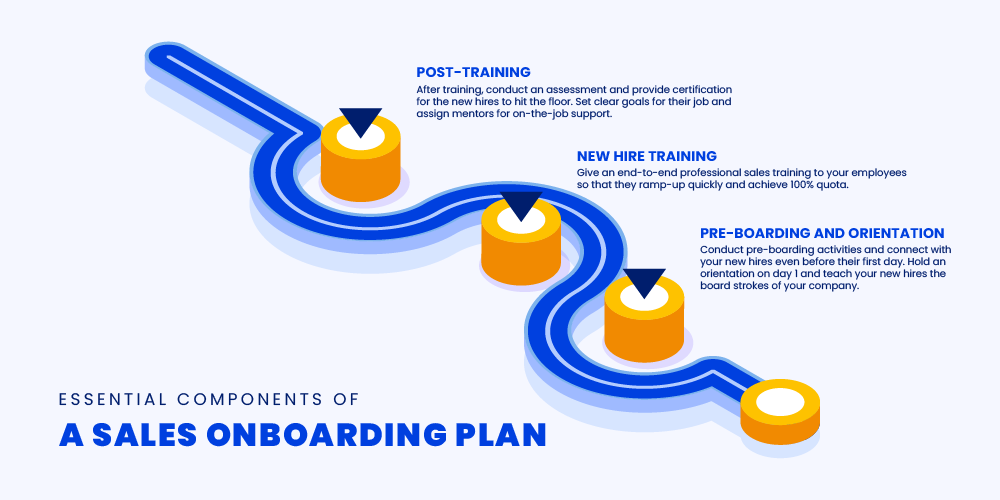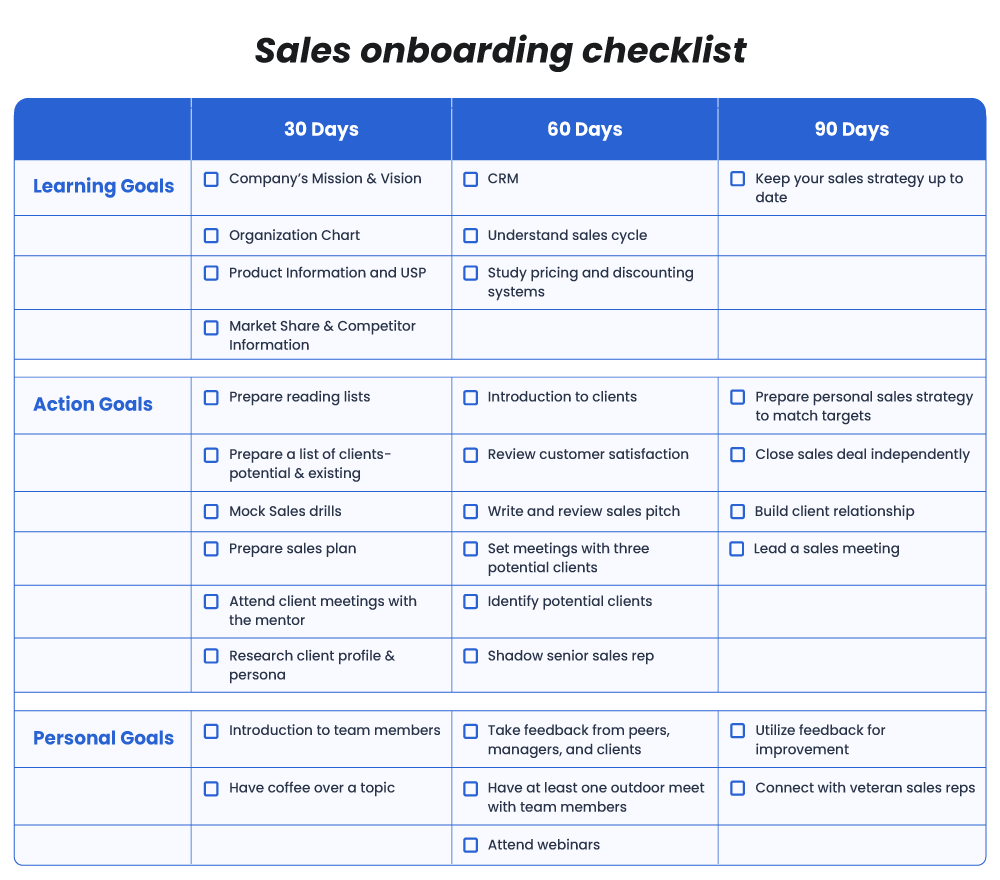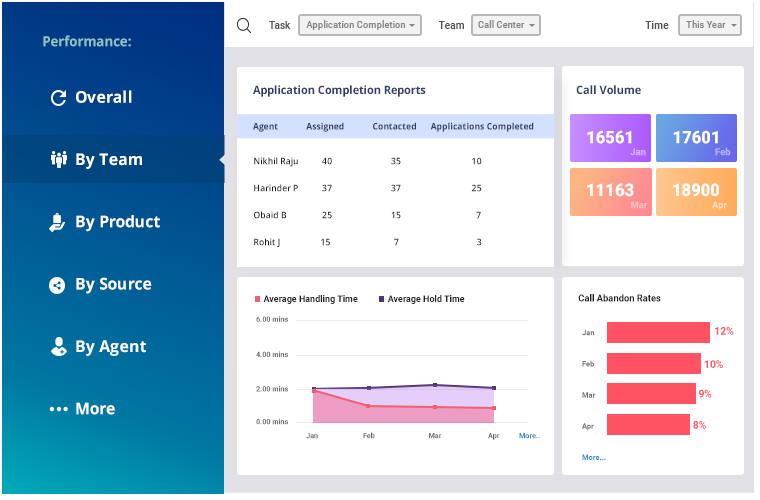Will the sales rookie you just hired start to perform from day one?
Well, they just might. But, in most cases, that’s not the right expectation.
To get them acquainted with your product/service, culture, people, and processes, you need to coach them right and give them time and direction.
This is where a good sales onboarding process plays a role. So,
What is Sales Onboarding?
Sales onboarding encapsulates the entire process of welcoming and connecting new hires on a sales team. It is the process of inducting, training, and providing resources to new hires to equip them with the skills and knowledge required to perform in their newly assigned role.
Traditional sales onboarding programs often fail for this principal reason: Too much to know, too little know-how.
If your sales reps have selling skills, but aren’t yet familiar with the products and services your organization sells, then training new hires on these aspects of your business is crucial.
The benefits of sales onboarding include reduced ramp time, increased quota attainment, and improved relationships, making it essential to have a well-structured program. If the sales leader fulfills this role effectively, he/she provides a reliable source of answers as new hires navigate their learning journey. Additionally, onboarding lets sales leaders know about the salesperson’s strengths and shortcomings, which helps them grow. Let’s take a deeper look at why sales onboarding matters
In this article, we will talk about how to onboard a new sales rep, and also include sales managers in the onboarding process. We will also discuss tips and best practices to improve your sales onboarding process.
Let’s get started.
Understanding Sales Onboarding

In sales, every single day matters. Unlike other roles within a company, sales representatives face significant pressure to start bringing in revenue as quickly as possible. A structured onboarding plan is more than an introduction to your business.
Sales onboarding is a critical process for equipping new sales professionals with the skills they need to be successful in their role. It involves introducing your company’s standards, your approach to selling, and the tools they need to be successful. Onboarding is conducted during the first days, weeks, or months of a new role.
Sales onboarding encapsulates the entire process of welcoming and connecting new hires on a sales team. This starts as soon as a seller walks into the office or logs on for the first time.
Effective onboarding is essential for maximizing the value derived from the costs of recruitment. It sets the stage for success and drives productivity, especially in sales organizations where time is money. Adherence to a clearly defined sales process and continuous training around essential selling skills correlate with higher performance. Despite the benefits, many organizations still don’t have a formal onboarding program.
How to Design an Effective Sales Onboarding Process
Every good sales onboarding process has a few common objectives:
- Producing confident sales reps who fulfill organizational goals
- Increase sales reps’ levels of engagement with the company as well as its staff.
Expecting your new entrant to learn everything over a two-day orientation program can be overwhelming for everyone. Sales onboarding is a process and not an event. When you know what your sales reps ought to achieve over a timeline, you will be able to draw a plan in advance. Staggering goals will also let you measure their learning curve accurately. While companies can face a number of challenges with onboarding new sales reps, there are a ton of great tips to help the process run smoothly. Here’s where having a plan is a good idea.
There is a need for establishing expectations for new hire participation in the process. Include clear checkpoints to measure progress. A best practice is to have 30-, 60-, and 90-day plans for onboarding.
A 30-60-90-day sales onboarding plan draws out a road map spread over the first three months of the employee’s joining. The subsequent section describes the nitty-gritty of this plan, along with a quick checklist.
Preparation (Before Day 1)
Before a new sales rep starts, it’s essential to prepare for their onboarding process. This stage involves setting clear goals and objectives, developing a comprehensive onboarding plan, and assigning a mentor or buddy.
It’s also crucial to ensure that all necessary materials and resources are available, including sales playbooks, manuals, and sales enablement solutions. By preparing ahead of time, you can ensure a smooth transition for the new sales rep and set them up for success.
The 30-60-90-day onboarding plan
The first 30 days
A little hand-holding will go a long way in acquainting the new rep with the company’s culture, vision, and mission. Help them break the ice through their many firsts and find their footing. This stage will involve answering a lot of questions for them and introducing them to new people and processes. Sales managers play a crucial role here by providing feedback, coaching, and structured training to ensure new hires can effectively acquire skills and integrate into the team.
Begin with the basics- company history & structure, product information, existing and potential buyers, and sales cycles. Get them familiar with the managers and their peers and initiate meetings for team building.
“Something as simple as a pizza party brings the team together. Sales is competitive, which can drive team members apart, but we’re all in the same boat, so being supportive can help every individual perform better,” says Arjun Mathur, Associate Director, Emeritus.
A few questions you ought to be asking at the end of the first 30 days:
1. Do they have a fair idea of the company?
2. Are they interacting?
3. Are they comfortable with the CRM?
4. Do they understand the company’s expectations?
5. Are they familiar with the product and services?
6. Do they have a complete understanding of the target market and competition?
The next 30 days
It’s now time to get hands-on for everything they have learned in the first 30 days. The sales manager plays a crucial role in this phase by providing ongoing coaching and feedback to ensure new hires align their performance with personal growth.
A few questions you ought to be asking now:
1. Are they confident enough to interact with leads and meet clients?
2. Are they motivated to learn more?
3. Are they participating in meetings?
4. Are they taking feedback?
5. How is mentoring working out?
The last 30 days
By day 60, new sellers will have in-depth training on products, services, buyer personas, tools, sales methodologies and workflow processes. It’s important to incorporate hands-on experience with sales calls and presentations.
At this point, your reps should be raring to go. By now, they should have a clear understanding of their customers, should be able to make independent sales calls, and should have built a solid network.
A few questions you ought to be asking now:
1. Are we able to measure progress?
2. Are they meeting targets?
3. Have they assimilated the company’s culture?
4. What is the market’s feedback?
A 30-60-90-day plan should match the company’s objectives. It should be measurable and should be able to identify task completion. Above all, it should be flexible to include new parameters based on needs. Here’s a sample checklist for a 30-60-90-day plan.

You can bookmark this page or download this editable pdf checklist to share with your team.
Why Do You Need a Well-defined Sales Onboarding Program?
Fostering a strong connection between the employee and the organization starts with a great sales onboarding program. When an organization invests in a rep’s training, they provide them with the information they need to do their work more successfully. There are many benefits of sales onboarding – as it goes far beyond providing a few playbooks and training sessions to new sales staff.
Sales reps will succeed when they thoroughly understand what they are selling and how they can get results. Having a great sales onboarding program boosts the success of the entire sales team. It gives them more credibility and confidence.
Devising new ways to nurture prospects has always been the focus of almost every organization. But they often forget that their sales reps need nurturing too. In a likely event where you would look at onboarding as a time-consuming process, you would instead let your sales reps learn on the job. However, investing time and resources in your reps pays off in terms of productivity and retention. A well-defined sales onboarding program should include clear sales processes based on past successes. These processes must be followed by salespeople to ensure optimal outcomes. For instance, 69 percent of employees are more likely to stay with a company for three years had they experienced great onboarding.
Inspire them to stay
Quitting of sales reps is not just expensive, but it affects teams and productivity. An effective sales onboarding program will help you in retaining the talent that you have recruited, especially when it comes to sales team members. Here’s how.
A good training program and a curriculum will produce knowledgeable salespeople who will be great at their job. Doing their job well will bring tangible results from the very start. More sales, an increasing client base, good customer feedback, and appreciation from managers will produce highly engaged employees. And motivated employees will have no reasons to jump ship.

Imagine yourself in the shoes of a new rep being drowned in a lot of theory on your first day in an event they called the Orientation Program. Remember that judging and evaluating is a two-way street, and chances are your new rep won’t be impressed on their first day. A sales rep who expected a fun and knowledgeable joining experience might be severely disappointed. They might build notions about your organization that aren’t necessarily true and likely to affect their tenure at your company. All because of a poorly planned onboarding process.
Now, if you have just recruited a talented new rep, you probably cannot wait to channel all your training energy. A little planning and empathy will go a long way in providing the best onboarding experience for your new rep.
Benefits of a well-defined sales onboarding program
Speaking of productivity, organizations with a standard onboarding process see 50% higher productivity from new hires and increased employee engagement.
A sales ramp-up period is the amount of time it takes for a new sales rep to be market-ready and reach their full productivity level that meets your organization’s goals. The ramp-up time will, of course, vary across industries, but the objective remains the same. That is, to minimize ramp-up time. However, it’s important to remember that an amateur rep can not only jeopardize sales pitches with their half-baked knowledge but will also be difficult to retain owing to their lack of motivation. An onboarding program will get them up to speed much quicker, thus enhancing their overall productivity.
At the same time, an onboarding process needs to have the right balance. A process that declares a sales rep ready much before they actually are can impair productivity. And a process that goes overboard can exhaust a new employee and waste valuable resources. The key to creating an effective onboarding process lies in taking one step at a time.
Sales Onboarding Best Practices
While companies can face a number of challenges with onboarding new sales reps, there are a ton of great tips to help the process run smoothly
Here are a few best practices to keep in mind while drawing out your onboarding plan:
Material & Resources
To make sales onboarding as effective as possible, all training materials and resources should be at a sales reps fingertips whenever they need them during the sales process. The key is to provide information in a format that’s informative and digestible so reps can absorb new knowledge quickly and apply it in the field as they navigate through the sales funnel.
Instead of traditional static slide shows consider using more dynamic formats like instructional videos, interactive story formats and gamified experiences. These are more engaging and help reinforce learning in a more memorable and fun way. For example, videos can show real-world scenarios, story based formats can give reps context for how to handle specific situations. Quizzes and games can be a fun and effective way to test understanding and keep reps motivated as they move through the training.
Depending on which stage of the 30-60-90 day plan a sales rep is in, you can layout content accordingly.
“One way to standardize training for a sales team is to share the list of common objections and practice cold calls with new recruits,” says Anil Kumar, Director – Sales, LeadSquared.
Goals & Numbers
Realistic sales targets are like gear shifts, they bridge the gap between learning new skills and applying them. When new sales reps have concrete and achievable goals, it’s easier for them to stay motivated and focused. Average ramp time for new sales reps can be anywhere between six and twelve months. Rather than leaving them to guess what they should be aiming for, give them tangible goals they can work towards.
These goals might align with company goals but also individual milestones such as number of deals to close in a certain timeframe or revenue to hit by end of quarter. Providing clear metrics helps reps understand what’s expected of them and gives them a sense of accomplishment as they track their progress.
These numbers should be challenging but also realistic and within their reach if they put in the work. Setting these measurable goals and having regular check-ins to track progress helps keep momentum and the team aligned. Reps should know exactly when and how they will be evaluated so they can focus their efforts in the most productive way possible.
To measure and track sales performance you need to use the right tools to get actionable insights on individual and team performance. Sales performance measurement tools like LeadSquared’s ACE. ACE gives you a complete solution to track key metrics and optimize sales processes. It is a powerful platform that aggregates data from multiple touchpoints so sales managers can see everything from lead generation and conversion rates to activity levels and sales cycle times. The tool’s analytics dashboard shows real-time performance data, how sales reps are performing against targets, and where they need to improve. Sales reps can be familiarized with the tracking system so that their efforts materialize in the right direction.
Shadowing & Mentoring
Mentoring, a tried and true strategy, has been around for ages and is an effective way to train and develop new talent in sales. It’s a structured opportunity for less experienced reps to learn directly from experienced pros, to pick up both technical skills and the softer, more nuanced parts of the job like client relationship management and negotiation tactics.
Sales leader involvement in the onboarding programs is crucial. They can brief the reps on a range of topics – beginning with a general introduction to the organization, its culture, and values, before delving into the intricate details of the company’s sales methodologies, CRM systems, and unique selling propositions.
Shadowing an experienced sales rep gives new hires a real-time look at how deals are closed, how objections are handled and how to engage with different customer personalities. It’s also a chance to see how a more seasoned pro handles challenges and adapts in a dynamic sales environment. But while this can be a powerful learning opportunity, you need to choose your mentors wisely.
The top performer in a team might not be the best teacher, as the qualities that make someone a strong individual contributor don’t always translate into strong coaching skills. A good mentor should be patient, communicative and willing to answer questions. They should be able to break down complex processes into simple terms for the mentee. By pairing new hires with the right mentor you ensure they get the guidance and support they need to succeed in their role.
Feedback & Evaluation
The onboarding process for sales reps must be dynamic and responsive, and adjust to feedback and evaluation. One of the most important parts of this is to actively ask reps to give you honest feedback about their onboarding experience, so you can find out where the process needs to be improved. By having regular conversations with them about their pain points – whether it’s lack of training resources, unclear expectations or mismatch in how they’re supported – you can proactively address those issues and build a better training program.
Besides asking reps for feedback, you can also measure the success of the onboarding process through quantitative metrics such as key performance indicators (KPIs). These might be conversion rates for each rep, size of their pipeline, time to ramp up to full productivity, and overall scorecard.
Monitoring these KPIs closely not only helps you measure individual performance but also serves as a benchmark for the onboarding process. Are reps hitting their targets faster? Are they converting leads more efficiently? If not, what needs to change to get them back on track? This ongoing evaluation ensures the onboarding process evolves and improves over time and helps each rep reach their full potential.
For instance, you can use LeadSquared Sales Execution CRM to track KPIs and individual reps’ performances.

Sales Onboarding Software and Tools
Sales onboarding Tools – why do you need them?
Sales onboarding software and sales enablement tools can streamline and automate much of the sales onboarding process. These solutions offer interactive content, customizable training modules, coaching functionality, and progress-tracking features.
Reps should also get the chance to practice what they learned before interacting with prospects in the real world.
As a sales manager, onboarding tools can be quite helpful to you. They would save time and ensure that all the new reps are on the same page in the learning process. They include:
- Sales enablement platforms
- Learning management systems (LMS)
- Customer relationship management (CRM) software
- Sales analytics tools
- Onboarding software specifically designed for sales teams
When selecting a sales onboarding software or tool, consider the following factors:
- Ease of use and navigation
- Customization options
- Integration with existing systems and tools
- Scalability and flexibility
- Cost and ROI
Remote Sales Onboarding
Remote sales onboarding is becoming increasingly common, especially with the rise of remote work. To ensure a successful remote sales onboarding process, consider the following best practices:
- Use video conferencing tools to facilitate face-to-face interactions
- Utilize online training modules and interactive content
- Assign a mentor or buddy to provide support and guidance
- Establish clear communication channels and regular check-ins
- Use sales ana
lytics tools to track progress and provide feedback
By following these best practices, you can ensure a successful remote sales onboarding process that sets your new sales reps up for success, even from a distance.
In Conclusion
Sales onboarding is a continuous process that needs customization and optimization. Optimization is fuelled by many factors and, most importantly, effort and intent. The company’s objectives, the quality of sales reps, and the introduction of new technology determine the type of process you want to choose for the company.
First impressions are important for major life events such as starting a new job. A good onboarding experience sets sales reps on the right track to adapt to their new work environment and learn new systems. It also shows that you are also invested in their career enhancement besides company profits.
When new reps get the tools and information they need right from the start, they are more likely to buy into the company’s goals, bond with the sales team through shared experiences, and contribute in a positive way every day.
Focus on ensuring the sales rep comprehends the company’s selling methodology and possesses essential selling skills. A good onboarding process can provide a solid foundation from which confident salespeople will stem. It will build the next sales leaders. For what it’s worth, a good onboarding process can also act as a magnet to attract the best talent in the market.







